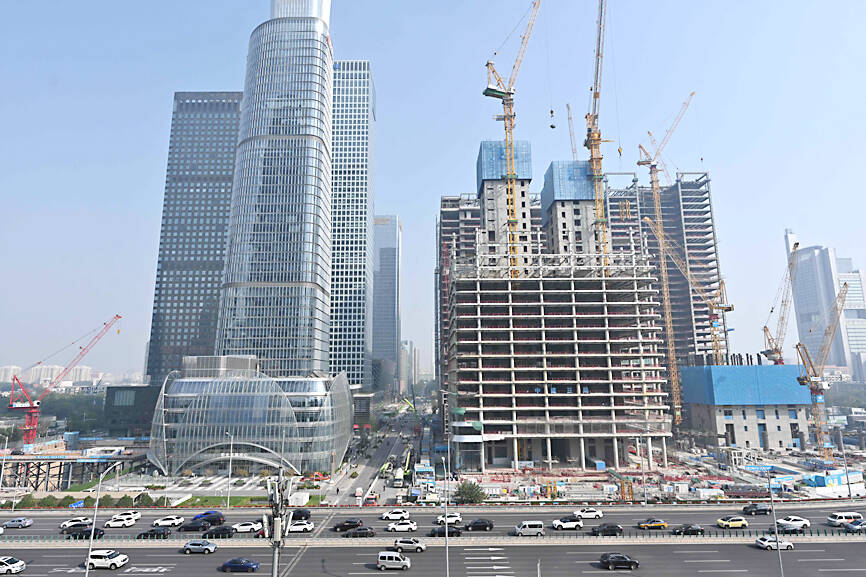China’s multiyear property crisis is set to drag on next year as prices and sales remain weak despite the government’s stimulus push to spur demand, according to Fitch Ratings.
China’s new home prices will fall by another 5 percent next year, as measured by China’s official statistics bureau, or roughly at the same pace this year, said Wang Ying (王穎), managing director at Fitch in Shanghai. Wang expects new-home sales to decline another 10 percent by area.
“The turning point for real estate sector hasn’t come yet,” Wang said. “Whether the recent warm-up can continue faces huge uncertainty.”

Photo: Adek Berry, AFP
China in the past two months unleashed its strongest package of policies to boost the property market, including cutting borrowing costs on existing mortgages, relaxing buying curbs in big cities and lowering taxes on home purchases.
The trading hub of Guangzhou became the first tier-1 city to remove all restrictions on buying residential property. Beijing, Shanghai and Shenzhen allowed more people to purchase residences in suburban areas, while letting others buy more homes.
The measures helped ease declines in China’s home prices for a second month last month. But the recovery in sales has been mostly limited to top-tier cities, and hasn’t spilled over to smaller cities, Wang said. What’s worse, prices in existing home markets have continued to decline and listings have kept piling up, suggesting the closely-watched segment in mega cities hasn’t reached its bottom, Wang added.
That will put further pressure on Chinese banks, which have been battling record low margins, sinking profits and rising bad debt from corporate borrowers. Net interest margins at Chinese banks shrank to 1.5 percent in the third quarter, the lowest in Asia Pacific, and could narrow again next year, said Vivian Xue (薛慧如), Fitch director on financial institutions.
Bad loan ratios from residential mortgages edged up by 10 to 20 basis points in recent quarters as expectations of weak income and slow delivery of finished homes damp buyers’ willingness on mortgage repayments, Xue said.
China is also facing economic headwinds as Donald Trump moves into office next year. Investors expect Beijing to roll out more stimulus policies to offset damages brought on by any additional tariffs. The country’s growth could fall by as much as two percentage points should Trump follow through on his plan to raise import taxes to 60 percent for Chinese goods, economists at Standard Chartered PLC and Macquarie Group Ltd have said.
This month, China unveiled a 10 trillion yuan (US$1.38 trillion) program to help resolve its local government debt crisis. But Davis Sun (孫浩), a senior director at Fitch, is taking a “cautious view” on how effective the package will be, adding that some local government financing vehicles might label themselves differently to circumvent restrictions from taking on more hidden debt.

SEEKING CLARITY: Washington should not adopt measures that create uncertainties for ‘existing semiconductor investments,’ TSMC said referring to its US$165 billion in the US Taiwan Semiconductor Manufacturing Co (TSMC, 台積電) told the US that any future tariffs on Taiwanese semiconductors could reduce demand for chips and derail its pledge to increase its investment in Arizona. “New import restrictions could jeopardize current US leadership in the competitive technology industry and create uncertainties for many committed semiconductor capital projects in the US, including TSMC Arizona’s significant investment plan in Phoenix,” the chipmaker wrote in a letter to the US Department of Commerce. TSMC issued the warning in response to a solicitation for comments by the department on a possible tariff on semiconductor imports by US President Donald Trump’s

The government has launched a three-pronged strategy to attract local and international talent, aiming to position Taiwan as a new global hub following Nvidia Corp’s announcement that it has chosen Taipei as the site of its Taiwan headquarters. Nvidia cofounder and CEO Jensen Huang (黃仁勳) on Monday last week announced during his keynote speech at the Computex trade show in Taipei that the Nvidia Constellation, the company’s planned Taiwan headquarters, would be located in the Beitou-Shilin Technology Park (北投士林科技園區) in Taipei. Huang’s decision to establish a base in Taiwan is “primarily due to Taiwan’s talent pool and its strength in the semiconductor

An earnings report from semiconductor giant and artificial intelligence (AI) bellwether Nvidia Corp takes center stage for Wall Street this week, as stocks hit a speed bump of worries over US federal deficits driving up Treasury yields. US equities pulled back last week after a torrid rally, as investors turned their attention to tax and spending legislation poised to swell the US government’s US$36 trillion in debt. Long-dated US Treasury yields rose amid the fiscal worries, with the 30-year yield topping 5 percent and hitting its highest level since late 2023. Stocks were dealt another blow on Friday when US President Donald

UNCERTAINTY: Investors remain worried that trade negotiations with Washington could go poorly, given Trump’s inconsistency on tariffs in his second term, experts said The consumer confidence index this month fell for a ninth consecutive month to its lowest level in 13 months, as global trade uncertainties and tariff risks cloud Taiwan’s economic outlook, a survey released yesterday by National Central University found. The biggest decline came from the timing for stock investments, which plunged 11.82 points to 26.82, underscoring bleak investor confidence, it said. “Although the TAIEX reclaimed the 21,000-point mark after the US and China agreed to bury the hatchet for 90 days, investors remain worried that the situation would turn sour later,” said Dachrahn Wu (吳大任), director of the university’s Research Center for